
How To Use An eLearning Mobile App To Digitize Instructor-Led Training
Using technology to deliver training is an integral part of most organizations’ training delivery these days. It comes as no surprise that using technology to empower trainers offering classroom training or virtual training has gained momentum.
Take a look at this report’s findings:
According to the “2016 Benchmark Report: The State of Online Training”,
“Technology has not decreased the demand for Instructor-Led Training, but gives instructors new tools to reach learners…The trend in Instructor-Led learning is enablement through technology, both in hybrid and fully virtual delivery“.
In this article, I share a case study to demonstrate how we helped one of our customers provide facilitated training by digitizing ILT using a learning app (or an eLearning app). Before sharing the case study, let me share what learning apps are and what benefits they offer.
What Are Learning Apps?
Considering the number of apps we use during our day, using apps for learning, or eLearning mobile apps, is a great way to engage the learners.
Learning apps bring the experience of native apps to learning, and they use several aspects of mobile learning (including microlearning and integrated social learning features) to keep learners engaged. They can be used in varied formats, including to:
- Offer/Support Formal online training.
- Provide Performance Support.
- Support ILT.
- Provide a learning journey (ongoing connect with learners) and offer remediation or on-going reinforcements.
What Are The Benefits Of Integrating Mobile Apps Into Your Training Delivery?
eLearning mobile apps enable an organization to:
- Have an efficient Performance Support Tool platform.
- Make workforce learning possible anytime, anywhere.
- Ensure that training reaches a broader and more mobile audience.
- Provide bite-sized learning anytime, anywhere.
- Provide access to Learning Path-based approaches in a smartphone environment.
- Make learning content available offline.
- Track course progress and completion.
Mobile apps can be used to offer online training and can be used to digitize Instructor-Led Training (ILT).
What Are The Factors That Are Pushing Organizations To Digitize Instructor-Led Training Delivery?
From an organizational perspective, the primary reasons or challenges triggering a re-evaluation of delivery through ILT are:
- Reduction in overall training budgets.
- Reduced budgets for travel costs.
- Reduced time to train the workforce.
- Easier tracking of training impact through digitization.
- An easier approach to updating digitized learning.
From the learner’s standpoint, organizations seek training approaches that:
- Provide flexibility on how learners want to learn.
- Empower learners to study at their pace.
- Adapt to varied learning styles.
- Offer the flexibility to be taken “on the go”.
Many of these triggers are leading to:
- Higher adoption of online training.
- Blended training delivery.
- Innovative approaches to digitizing ILT.
What Is The Relevance Of Mobile Apps To ILT Delivery?
Today, more than ever, there is a clear need to enhance the way ILT is delivered and to leverage technology and eLearning strategies.
Mobile apps are one of the mLearning, or mobile learning, formats and can be used as effective tools that offer enriched ILT sessions. Using eLearning mobile apps for ILT is an innovative way to digitize ILT. Let me share a case study that showcases how we used a mobile learning app to support ILT delivery.
Case Study: Leveraging Mobile App To Support An ILT Session
Background
Our customer wanted us to build an app that could help trainers host and track classroom training sessions on a tablet. This app would help them deliver classroom training in various locations and provide relevant job aids and the learning material to learners as printouts for future reference.
Our Approach
We developed an eLearning mobile app that incorporated some key differentiators. For example:
- It can be installed on any Android tablet and offers the following key features:
- It provides packages in multiple languages. We have localized the training in 6 international languages that the trainer can pick from depending on the audience profile.
- We created the ILT material (FG, PG, and ILT deck) with a rich look and feel, based on our customer’s source content. These collaterals are embedded in the app.
- The app plays PPT files that can be also projected onto a screen.
- It provides user notifications when new content is added and made available.
- Trainers and users have the flexibility to download content into the app for offline use.
- Trainers can use the app to:
- Download required training material at any location once online.
- Host videos, PDFs, PPTs, and other learning documents.
- Print student handouts.
Let us look at some screenshots of the eLearning app now.
eLearning App Screenshots
Opening Screen
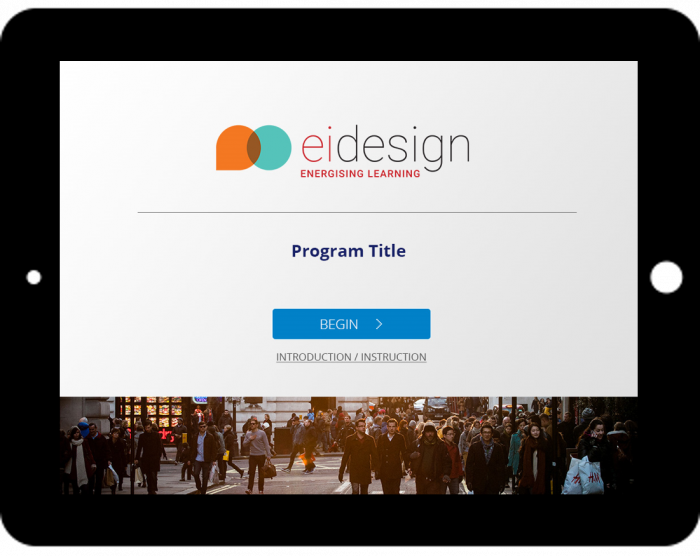
Setting The Context-Program Overview
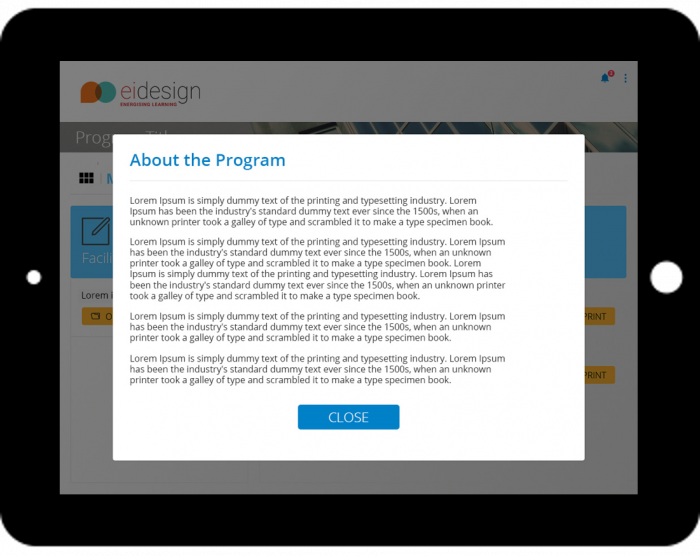
Visual Map-List Of All Modules
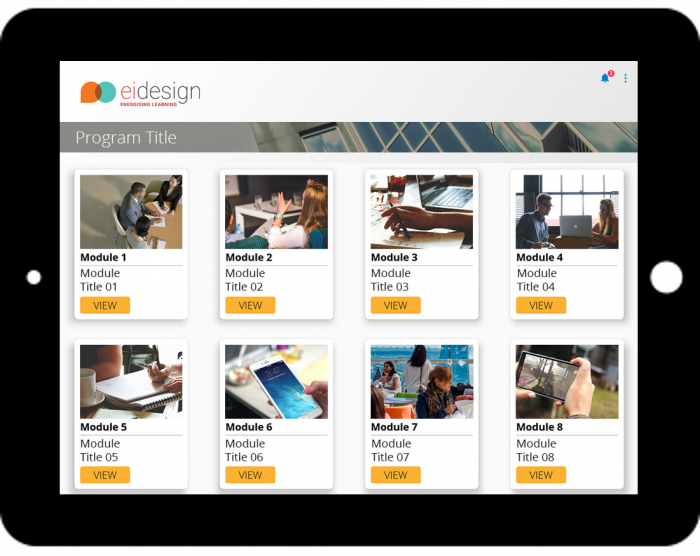
List Of Assets In A Given Module
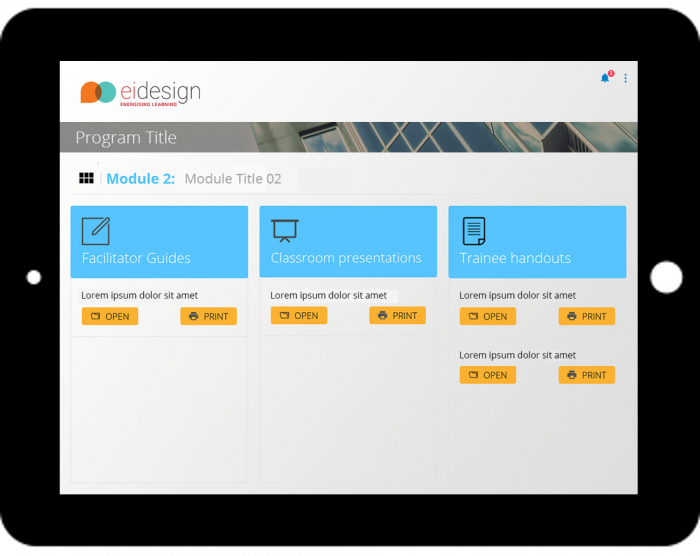
Additional Assets: FAQs And Take A Tour
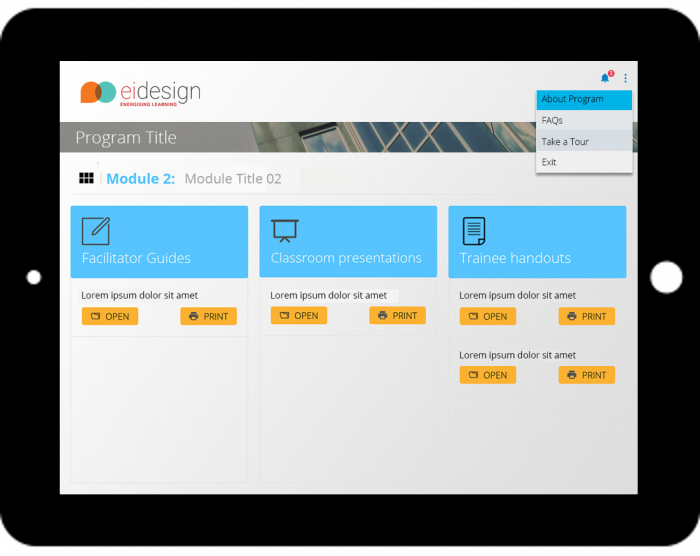
A Glimpse Of The Assets
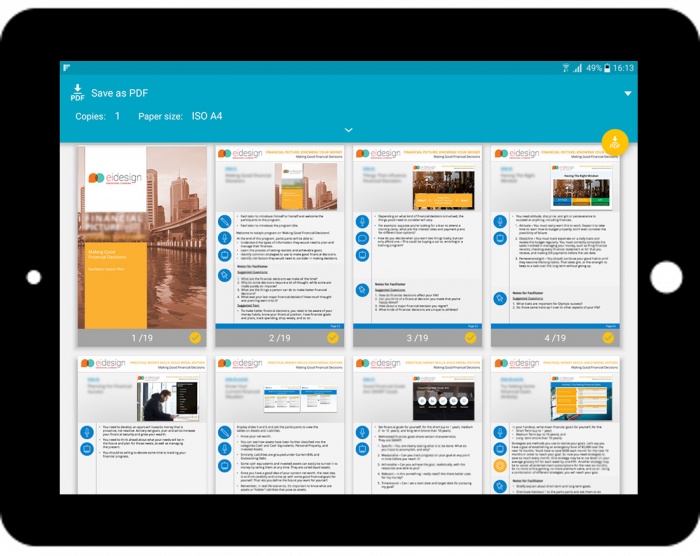
I hope this article provides you with cues on how you can leverage innovative online training tools like eLearning mobile apps to deliver high-impact, digitized Instructor-Led Training (ILT). If you have any queries or need specific support, do contact me at apandey@eidesign.net.
Read More



